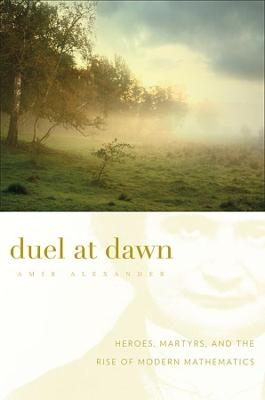
Duel at Dawn
Heroes, Martyrs, and the Rise of Modern Mathematics
Seiten
2011
Harvard University Press (Verlag)
978-0-674-06174-3 (ISBN)
Harvard University Press (Verlag)
978-0-674-06174-3 (ISBN)
Alexander shows how popular stories about mathematicians are really morality tales about their craft as it relates to the world. In the eighteenth century, he says, mathematicians were idealized as child-like, eternally curious; by the nineteenth century, brilliant mathematicians became Romantic heroes like poets, artists, and musicians.
In the fog of a Paris dawn in 1832, Évariste Galois, the 20-year-old founder of modern algebra, was shot and killed in a duel. That gunshot, suggests Amir Alexander, marked the end of one era in mathematics and the beginning of another.
Arguing that not even the purest mathematics can be separated from its cultural background, Alexander shows how popular stories about mathematicians are really morality tales about their craft as it relates to the world. In the eighteenth century, Alexander says, mathematicians were idealized as child-like, eternally curious, and uniquely suited to reveal the hidden harmonies of the world. But in the nineteenth century, brilliant mathematicians like Galois became Romantic heroes like poets, artists, and musicians. The ideal mathematician was now an alienated loner, driven to despondency by an uncomprehending world. A field that had been focused on the natural world now sought to create its own reality. Higher mathematics became a world unto itself—pure and governed solely by the laws of reason.
In this strikingly original book that takes us from Paris to St. Petersburg, Norway to Transylvania, Alexander introduces us to national heroes and outcasts, innocents, swindlers, and martyrs–all uncommonly gifted creators of modern mathematics.
In the fog of a Paris dawn in 1832, Évariste Galois, the 20-year-old founder of modern algebra, was shot and killed in a duel. That gunshot, suggests Amir Alexander, marked the end of one era in mathematics and the beginning of another.
Arguing that not even the purest mathematics can be separated from its cultural background, Alexander shows how popular stories about mathematicians are really morality tales about their craft as it relates to the world. In the eighteenth century, Alexander says, mathematicians were idealized as child-like, eternally curious, and uniquely suited to reveal the hidden harmonies of the world. But in the nineteenth century, brilliant mathematicians like Galois became Romantic heroes like poets, artists, and musicians. The ideal mathematician was now an alienated loner, driven to despondency by an uncomprehending world. A field that had been focused on the natural world now sought to create its own reality. Higher mathematics became a world unto itself—pure and governed solely by the laws of reason.
In this strikingly original book that takes us from Paris to St. Petersburg, Norway to Transylvania, Alexander introduces us to national heroes and outcasts, innocents, swindlers, and martyrs–all uncommonly gifted creators of modern mathematics.
Amir Alexander is a historian and writer in Los Angeles.
* Introduction: A Showdown in Paris * Part I: Natural Men * The Eternal Child * Natural Mathematics * Part II: Heroes and Martyrs * A Habit of Insult: The Short and Impertinent Life of Evariste Galois * The Exquisite Dance of the Blue Nymphs * A Martyr to Contempt * Part III: Romantic Mathematics * The Poetry of Mathematics * Purity and Rigor: The Birth of Modern Mathematics * Part IV: A New and Different World * The Gifted Swordsman * Conclusion: Portrait of a Mathematician * Notes * Acknowledgments * Index
| Erscheint lt. Verlag | 14.11.2011 |
|---|---|
| Reihe/Serie | New Histories of Science, Technology, and Medicine |
| Zusatzinfo | 10 halftones, 14 line illustrations |
| Verlagsort | Cambridge, Mass |
| Sprache | englisch |
| Maße | 156 x 235 mm |
| Themenwelt | Geschichte ► Allgemeine Geschichte ► Neuzeit (bis 1918) |
| Geisteswissenschaften ► Geschichte ► Regional- / Ländergeschichte | |
| Mathematik / Informatik ► Mathematik ► Geschichte der Mathematik | |
| Sozialwissenschaften ► Soziologie | |
| ISBN-10 | 0-674-06174-8 / 0674061748 |
| ISBN-13 | 978-0-674-06174-3 / 9780674061743 |
| Zustand | Neuware |
| Haben Sie eine Frage zum Produkt? |
Mehr entdecken
aus dem Bereich
aus dem Bereich
Europa 1848/49 und der Kampf für eine neue Welt
Buch | Hardcover (2023)
DVA (Verlag)
48,00 €
Giordano Bruno - ein ketzerisches Leben
Buch | Hardcover (2024)
C.H.Beck (Verlag)
29,90 €


